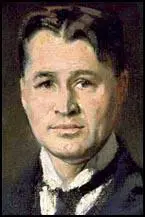John Jay Chapman

John Jay Chapman was born in New York City on 2nd March, 1862. His father, Henry Grafton Chapman, was a broker who eventually became president of the New York Stock Exchange. His grandmother, Maria Weston Chapman, was one of the leading campaigners against slavery and worked with William Lloyd Garrison on The Liberator. In 1839 Chapman, Lucretia Mott and Lydia Maria Child, became the first women to be elected to the executive committee of the Anti-Slavery Society.
John Jay Chapman attended St, Paul's School, Concord and Harvard. After graduating in 1885, Chapman travelled around Europe before returning to study at the Harvard Law School. In 1887 Chapman assaulted a man for insulting his girlfriend, Minna Timmins. He punished himself for this act by putting his left hand into a fire. It was so badly burnt he had to have it amputated.
In 1888 Chapman was admitted to the New York bar. He married Minna Timmins in 1889 but she died giving birth to their third child. Chapman later married Elizabeth Chanler. Chapman became involved in politics and joined the City Reform Club and the Citizens' Union. He lectured on the need for reform and edited the journal The Political Nursery (1897-1901). He also wrote two books about the need for political change: Causes and Consequences (1898) and Practical Agitation (1900).
Chapman supported the political campaigns of Theodore Roosevelt and Seth Low but later criticized them for being less radical in power than they had been in opposition. Chapman argued that politicians tended to be influenced by the power of big business. Faced with the choice between "lucrative malpractice and thankless honesty," he claimed they usually opted for corruption.
After ten years as a lawyer, Chapman became a full-time writer. A collection of articles on literature, Emerson and Other Essays, was published in 1898. Chapman was greatly influenced by the work of Ralph Waldo Emerson, and argued in his book that: "While the radicals of Europe were revolting in 1848 against the abuses of a tyranny whose roots were in feudalism, Emerson, the great radical of America, the arch radical of the world, was revolting against the evils whose roots were in tyranny, and by bringing back the attention of political thinkers to its starting point, the value of human character, he had advanced the political thought of the world by one step. He had pointed out for us in this country to what end our efforts must be bent."
In 1911 Chapman became involved in the campaign to bring to justice the people who lynched Zach Walker in Coatsville, Pennsylvania. The National Association for the Advancement of Coloured People investigated the case and discovered the names of the people responsible. However, the authorities were unwilling to bring the case to court. One of the speeches that Chapman made on the case was published as an article by Harper's Weekly in September, 1912.
Chapman also wrote several plays including The Treason and Death of Benedict Arnold (1910). Other books by Chapman included Learning and Other Essays (1910), a biography of William Lloyd Garrison (1913), Songs and Poems (1919), A Glance Toward Shakespeare (1922), Dante (1927) and Lucian, Plato and Greek Morals (1931). These books were highly praised and Edmund Wilson called him the "best writer on literature of his generation."
Chapman's last book, New Horizons in American Life (1932), was an attack on the way that the United States education was being dominated by the needs of business.
John Jay Chapman died on 4th November, 1933.
Primary Sources
(1) John Jay Chapman, Emerson and Other Essays (1898)
While the radicals of Europe were revolting in 1848 against the abuses of a tyranny whose roots were in feudalism, Emerson, the great radical of America, the arch radical of the world, was revolting against the evils whose roots were in tyranny, and by bringing back the attention of political thinkers to its starting point, the value of human character, he had advanced the political thought of the world by one step. He had pointed out for us in this country to what end our efforts must be bent.
(2) John Jay Chapman, Causes and Consequences (1898)
A civilization based upon a commerce which is in all its parts corruptly managed will present a social life which is unintelligent and mediocre, made up of people afraid of each other, whose ideas are shop-worn, whose manners are self-conscious.
(3) John Jay Chapman wrote about the lynching of Zach Walker in Harper's Weekly (21st September, 1912)
The failure of the prosecution in this case, in all such cases, is only proof of the magnitude of the guilt, and of the awful fact that everyone shares in it. As I read the newspaper accounts of the scene enacted here in Coatesville a year ago, I seemed to get a glimpse into the unconscious soul of this country. I seemed to be looking into the heart of a criminal. The trouble has come down to us out of the past. The only reason that slavery is wrong is that it is cruel and makes men cruel and leaves them cruel. A nation cannot practice a course of inhuman crime for three hundred years and then suddenly throw off the effects of it.
